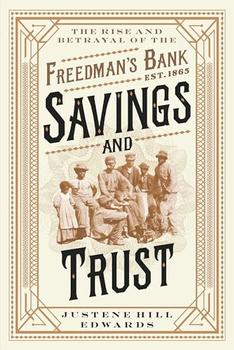
The Rise and Betrayal of the Freedman's Bank
by Justene Hill Edwards
A leading historian exposes how the rise and tragic failure of the Freedman's Bank has shaped economic inequality in America.
In the years immediately after the Civil War, tens of thousands of former slaves deposited millions of dollars into the Freedman's Bank. African Americans envisioned this new bank as a launching pad for economic growth and self-determination. But only nine years after it opened, their trust was betrayed and the Freedman's Bank collapsed.
Fully informed by new archival findings, historian Justene Hill Edwards unearths a major turning point in American history in this comprehensive account of the Freedman's Bank and its depositors. She illuminates the hope with which the bank was first envisioned and demonstrates the significant setback that the sabotage of the bank caused in the fight for economic autonomy. Hill Edwards argues for a new interpretation of its tragic failure: the bank's white financiers drove the bank into the ground, not Fredrick Douglass, its final president, or its Black depositors and cashiers. A page-turning story filled with both well-known figures like Abraham Lincoln, Frederick Douglass, Jay and Henry Cooke, and General O. O. Howard, and less well-known figures like Dr. Charles B. Purvis, John Mercer Langston, Congressman Robert Smalls, and Ellen Baptiste Lubin. Savings and Trust is necessary reading for those seeking to understand the roots of racial economic inequality in America.
"America's racial wealth gap can be traced to the collapse of the Freedman's Savings and Trust Company in 1874, according to this ingenious work of financial sleuthing.… [A] captivating narrative that reads like a slow-burn legal thriller." ―Publishers Weekly (starred review)
"Savings and Trust, in beautifully written and accessible prose, is a must-read that offers crucial context for understanding the economic plight of formerly enslaved people after the Civil War, racial capitalism, the racial wealth gap, and contemporary calls for reparations." ―Stephanie E. Jones-Rogers, author of They Were Her Property: White Women as Slave Owners in the American South
"In her gripping and elegantly written account of the Freedman's Bank, Justene Hill Edwards illuminates the extent to which the insidious backlash to Reconstruction resonates with us today. An essential read for anyone concerned about racial and economic justice." ―Marcia Chatelain, Pulitzer Prize–winning author of Franchise: The Golden Arches in Black America
"This is a revealing history of banking innovation and experimentation, the financial acuity of Black men and women, corruption among powerful trustees, and the failure of Congressional oversight that feels all too familiar in our own era of bank failures, governmental dysfunction, and financial malfeasance. Justene Hill Edwards argues convincingly that the Freedman's Bank debacle that lost millions of dollars earned and saved by hardworking, self-sacrificing, recently enslaved people is another little-known cause of the contemporary racial wealth gap." ―Tiya Miles, National Book Award–winning author of All That She Carried: The Journey of Ashley's Sack, a Black Family Keepsake
This information about Savings and Trust was first featured
in "The BookBrowse Review" - BookBrowse's membership magazine, and in our weekly "Publishing This Week" newsletter. Publication information is for the USA, and (unless stated otherwise) represents the first print edition. The reviews are necessarily limited to those that were available to us ahead of publication. If you are the publisher or author and feel that they do not properly reflect the range of media opinion now available, send us a message with the mainstream reviews that you would like to see added.
Any "Author Information" displayed below reflects the author's biography at the time this particular book was published.
Justene Hill Edwards is an associate professor of history at the University of Virginia and the author of both Unfree Markets and a forthcoming Norton Short on the history of inequality in America. She lives in Charlottesville, Virginia.




In youth we run into difficulties. In old age difficulties run into us
Click Here to find out who said this, as well as discovering other famous literary quotes!
Your guide toexceptional books
BookBrowse seeks out and recommends the best in contemporary fiction and nonfiction—books that not only engage and entertain but also deepen our understanding of ourselves and the world around us.